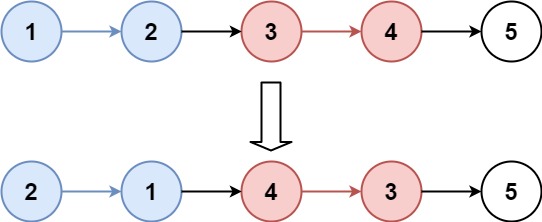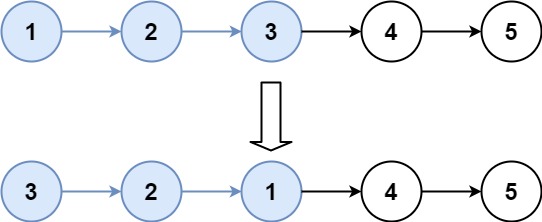LeetCode-in-All
25. Reverse Nodes in k-Group
Hard
Given a linked list, reverse the nodes of a linked list k at a time and return its modified list.
k is a positive integer and is less than or equal to the length of the linked list. If the number of nodes is not a multiple of k then left-out nodes, in the end, should remain as it is.
You may not alter the values in the list’s nodes, only nodes themselves may be changed.
Example 1:

Input: head = [1,2,3,4,5], k = 2
Output: [2,1,4,3,5]
Example 2:

Input: head = [1,2,3,4,5], k = 3
Output: [3,2,1,4,5]
Example 3:
Input: head = [1,2,3,4,5], k = 1
Output: [1,2,3,4,5]
Example 4:
Input: head = [1], k = 1
Output: [1]
Constraints:
- The number of nodes in the list is in the range
sz. 1 <= sz <= 50000 <= Node.val <= 10001 <= k <= sz
Follow-up: Can you solve the problem in O(1) extra memory space?
Solution
// Definition for singly-linked list.
// pub struct ListNode {
// pub val: i32,
// pub next: Option<Box<ListNode>>
// }
//
// impl ListNode {
// #[inline]
// fn new(val: i32) -> Self {
// ListNode {
// next: None,
// val
// }
// }
// }
impl Solution {
pub fn reverse_k_group(mut head: Option<Box<ListNode>>, k: i32) -> Option<Box<ListNode>> {
Solution::reverse(head, k)
}
pub fn reverse(mut head:Option<Box<ListNode>>, k: i32) -> Option<Box<ListNode>> {
if head.is_none() {
return None;
}
let mut new_head: Option<Box<ListNode>> = None;
let mut i = 0;
while let Some(mut head_val) = head.take() {
head = head_val.next.take();
head_val.next = new_head;
new_head = Some(head_val);
i += 1;
if i == k {
break;
}
}
if i != k {
// have to back out and return original list
return Solution::reverse(new_head, i);
}
// we now have two lists:
// head -> rest of list
// new_head -> reversed list
// i cannot figure out how in rust you do this in one pass,
// so we will go walk the list again to get the tail of new_head and make it head
// 'append'
head = Solution::reverse(head, k);
let mut tailw = &mut new_head;
if let Some(ref mut tail_val) = tailw {
let mut tail = tail_val;
while let Some(ref mut tail_next) = tail.next {
tail = tail_next;
}
tail.next = head;
}
new_head
}
}

